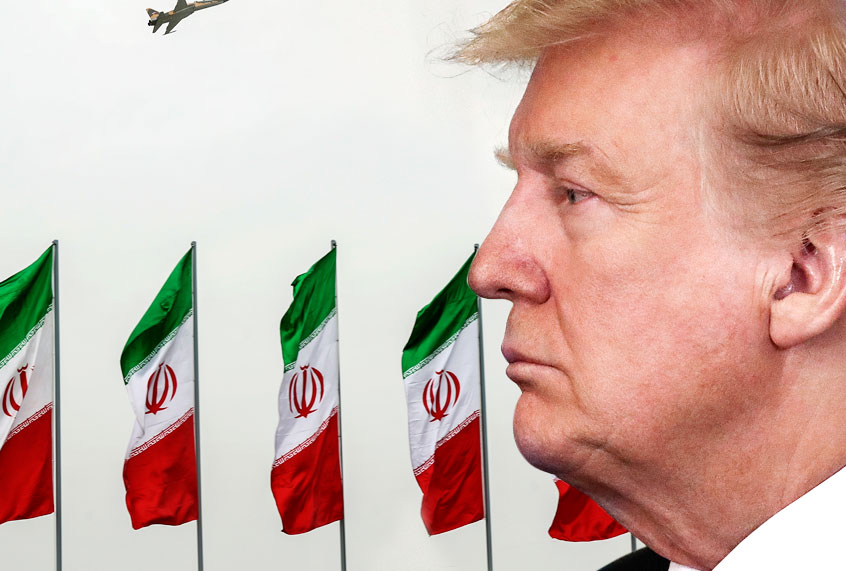Apparently, the White House has photographs of fully assembled Iranian missiles on boats, along with overheard generic conversations threatening possible attacks on Navy ships and commercial shipping or American troops in Iraq by Arab militias with Iran ties, according to The New York Times.
The Washington Post says that Pentagon and intelligence officials said that there have been three distinct Iranian actions: Captured hints of an Iranian threat against U.S. diplomatic facilities in the Iraqi cities of Baghdad and Irbil; U.S. concerns that Iran may be preparing to mount missile launchers on small ships in the Persian Gulf; and a directive from the Ayatollah Ali Khamenei to the Islamic Revolutionary Guard Corps and that some U.S. officials have interpreted as a potential threat to U.S. military and diplomatic personnel.
NBC News quotes the British deputy commander in the global coalition against the Islamic State as contradicting the risk of an attack altogether, either by Iran or its militia partners, citing the same evidence. Other European allies are openly questioning the nature of the intelligence that the United States is picking up.
In other words, the only thing we can be sure of is that there is a wide gulf in how to interpret whatever signs are being picked up from Iranian communications. Indeed, just how alarmed the Trump administration should be over the new intelligence is a subject of fierce debate among the White House, the Pentagon, the CIA and America’s allies, The Times concluded.
On Wednesday, the State Department ordered nonessential personnel to leave the U.S. missions in Baghdad and Irbil. The Times reported that the Pentagon was coming up with plans for the deployment of up to 120,000 U.S. troops to Iran – in the event that there is a provocation from Iran or its agents.
Discord in the administration
Meanwhile, Donald Trump denies both that there is such a plan — while saying that he would happily support one if there is a major provocation — and also denies that there is confusion or discord in his administration, as being widely reported in the news media. The discord pits the militarism favored by National Security Advisor John Bolton, with support from Secretary of State Mike Pompeo, on the one side, and Pentagon brass on the other, warning of the dangers of a war with Iran.
The Post said directly that Trump is frustrated with some of his top advisers, who he thinks could rush the United States into a military confrontation with Iran and shatter his long-standing pledge to withdraw from costly foreign wars, according to several U.S. officials. Trump apparently prefers a diplomatic approach to resolving tensions and wants to speak directly with Iran’s leaders.
Iranian leaders say ambiguously that they are showing “maximum restraint.”
Congress in the dark
Making it worse is that congressional leaders from both parties say that they are in the dark about the nature and source of the evidence being cited. Democrats, in particular, are saying that they want consultation from the White House to support any call for war or military action.
For the rest of us, the idea that we have a government that either has no policy directions other than “America First,” that we have leaders that apparently are in serious disagreement, that the president is being led by his three-year-old campaign promises, and that we can’t even agree on what we are looking at, is, well, pretty troubling.
The Post report said tnat Trump is not inclined to respond forcefully unless there is a “big move” from the Iranians, according to an unnamed senior White House official, but would be willing to respond forcefully if there are American deaths or a dramatic escalation, the official said.
As a citizen, I’d like to think there would be a wider consensus on such evidentiary questions, including with Congress, including with allies who would be needed, than to depend solely on the presidential gut.
News reports meanwhile suggest that Trump complains increasingly about Bolton’s aggressiveness. That has seemed the case in recent examination of U.S. statements and actions in Venezuela and North Korea.
Obviously, we should all be worried that all this saber-rattling can lead to errors on the ground where chances of misinterpretation or miscalculation seems the greatest, particularly since Iran depends on proxy militias outside its direct command.
There were sabotage attacks on Saudi oil tankers this week, for example. Was that Iranian-ordered? Were they rogue acts by militia groups?
The United States has ordered an aircraft carrier flotilla to the Persian Gulf, within range of Iranian missiles.
It seems to me there ought to be a priority about figuring out the right questions and interpretations of available evidence by Americans and our allies.



